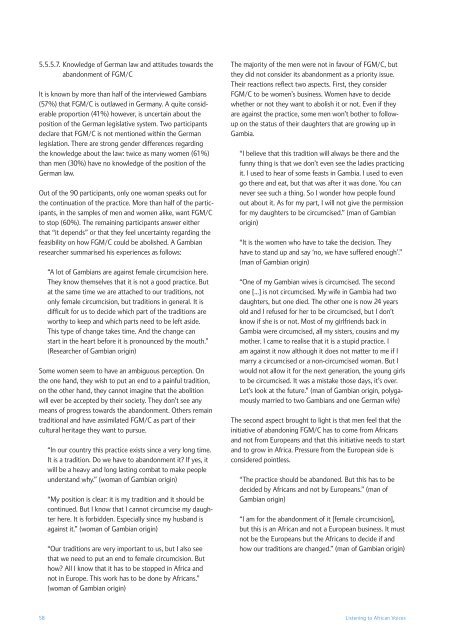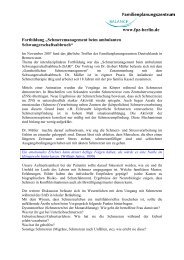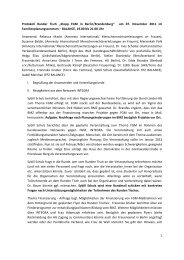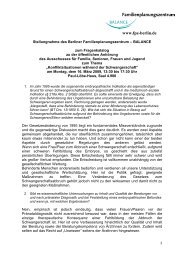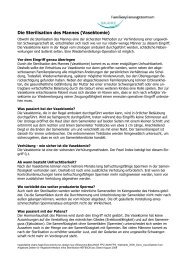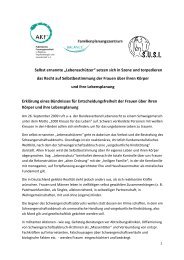Listening to African Voices - FPZ
Listening to African Voices - FPZ
Listening to African Voices - FPZ
Create successful ePaper yourself
Turn your PDF publications into a flip-book with our unique Google optimized e-Paper software.
5.5.5.7. Knowledge of German law and attitudes <strong>to</strong>wards theabandonment of FGM/CIt is known by more than half of the interviewed Gambians(57%) that FGM/C is outlawed in Germany. A quite considerableproportion (41%) however, is uncertain about theposition of the German legislative system. Two participantsdeclare that FGM/C is not mentioned within the Germanlegislation. There are strong gender differences regardingthe knowledge about the law: twice as many women (61%)than men (30%) have no knowledge of the position of theGerman law.Out of the 90 participants, only one woman speaks out forthe continuation of the practice. More than half of the participants,in the samples of men and women alike, want FGM/C<strong>to</strong> s<strong>to</strong>p (60%). The remaining participants answer eitherthat “it depends” or that they feel uncertainty regarding thefeasibility on how FGM/C could be abolished. A Gambianresearcher summarised his experiences as follows:“A lot of Gambians are against female circumcision here.They know themselves that it is not a good practice. Butat the same time we are attached <strong>to</strong> our traditions, no<strong>to</strong>nly female circumcision, but traditions in general. It isdifficult for us <strong>to</strong> decide which part of the traditions areworthy <strong>to</strong> keep and which parts need <strong>to</strong> be left aside.This type of change takes time. And the change canstart in the heart before it is pronounced by the mouth.”(Researcher of Gambian origin)Some women seem <strong>to</strong> have an ambiguous perception. Onthe one hand, they wish <strong>to</strong> put an end <strong>to</strong> a painful tradition,on the other hand, they cannot imagine that the abolitionwill ever be accepted by their society. They don’t see anymeans of progress <strong>to</strong>wards the abandonment. Others remaintraditional and have assimilated FGM/C as part of theircultural heritage they want <strong>to</strong> pursue.“In our country this practice exists since a very long time.It is a tradition. Do we have <strong>to</strong> abandonment it? If yes, itwill be a heavy and long lasting combat <strong>to</strong> make peopleunderstand why.” (woman of Gambian origin)“My position is clear: it is my tradition and it should becontinued. But I know that I cannot circumcise my daughterhere. It is forbidden. Especially since my husband isagainst it.” (woman of Gambian origin)“Our traditions are very important <strong>to</strong> us, but I also seethat we need <strong>to</strong> put an end <strong>to</strong> female circumcision. Buthow? All I know that it has <strong>to</strong> be s<strong>to</strong>pped in Africa andnot in Europe. This work has <strong>to</strong> be done by <strong>African</strong>s.”(woman of Gambian origin)The majority of the men were not in favour of FGM/C, butthey did not consider its abandonment as a priority issue.Their reactions refl ect two aspects. First, they considerFGM/C <strong>to</strong> be women’s business. Women have <strong>to</strong> decidewhether or not they want <strong>to</strong> abolish it or not. Even if theyare against the practice, some men won’t bother <strong>to</strong> followupon the status of their daughters that are growing up inGambia.“I believe that this tradition will always be there and thefunny thing is that we don’t even see the ladies practicingit. I used <strong>to</strong> hear of some feasts in Gambia. I used <strong>to</strong> evengo there and eat, but that was after it was done. You cannever see such a thing. So I wonder how people foundout about it. As for my part, I will not give the permissionfor my daughters <strong>to</strong> be circumcised.” (man of Gambianorigin)“It is the women who have <strong>to</strong> take the decision. Theyhave <strong>to</strong> stand up and say ‘no, we have suffered enough’.”(man of Gambian origin)“One of my Gambian wives is circumcised. The secondone […] is not circumcised. My wife in Gambia had twodaughters, but one died. The other one is now 24 yearsold and I refused for her <strong>to</strong> be circumcised, but I don’tknow if she is or not. Most of my girlfriends back inGambia were circumcised, all my sisters, cousins and mymother. I came <strong>to</strong> realise that it is a stupid practice. Iam against it now although it does not matter <strong>to</strong> me if Imarry a circumcised or a non-circumcised woman. But Iwould not allow it for the next generation, the young girls<strong>to</strong> be circumcised. It was a mistake those days, it’s over.Let’s look at the future.” (man of Gambian origin, polygamouslymarried <strong>to</strong> two Gambians and one German wife)The second aspect brought <strong>to</strong> light is that men feel that theinitiative of abandoning FGM/C has <strong>to</strong> come from <strong>African</strong>sand not from Europeans and that this initiative needs <strong>to</strong> startand <strong>to</strong> grow in Africa. Pressure from the European side isconsidered pointless.“The practice should be abandoned. But this has <strong>to</strong> bedecided by <strong>African</strong>s and not by Europeans.” (man ofGambian origin)“I am for the abandonment of it [female circumcision],but this is an <strong>African</strong> and not a European business. It mustnot be the Europeans but the <strong>African</strong>s <strong>to</strong> decide if andhow our traditions are changed.” (man of Gambian origin)58<strong>Listening</strong> <strong>to</strong> <strong>African</strong> <strong>Voices</strong>


